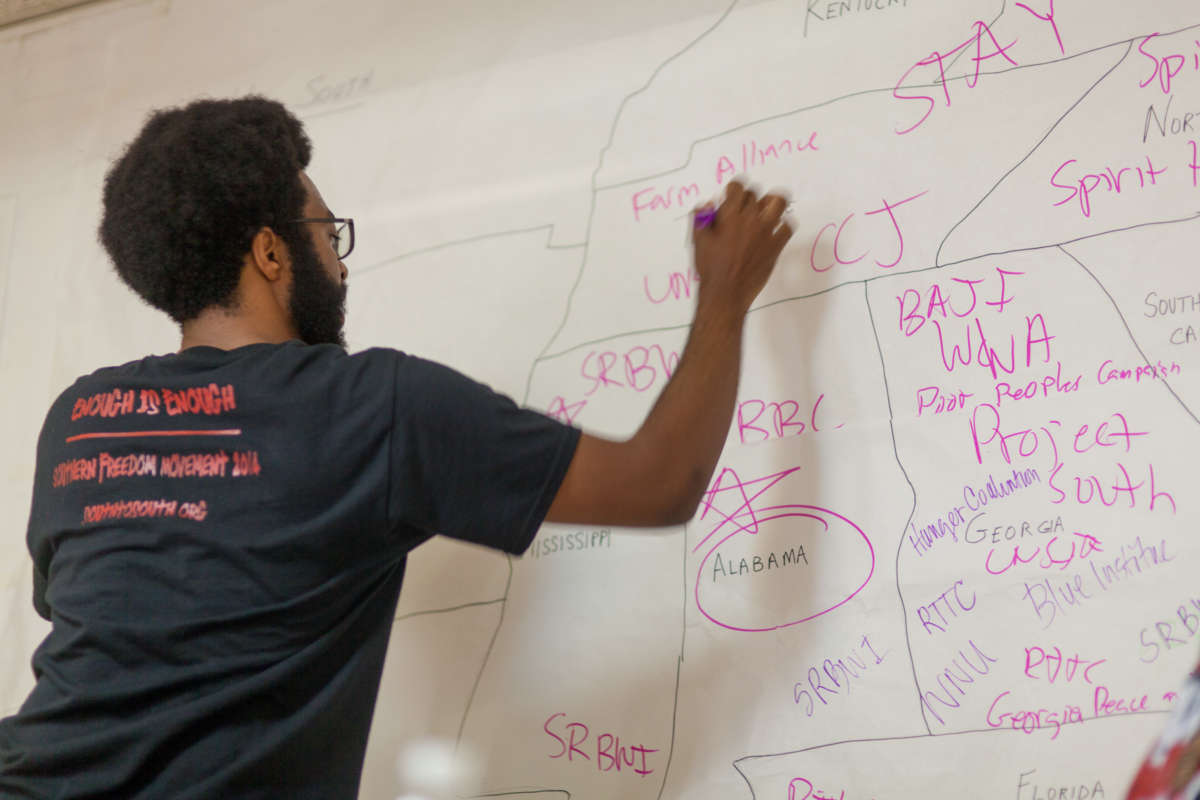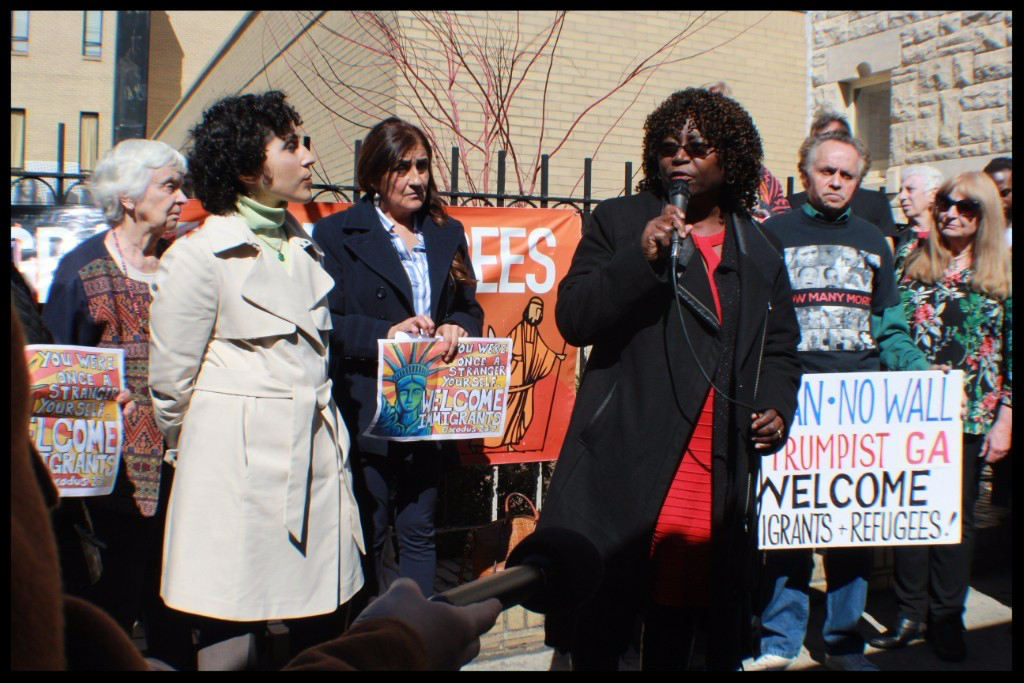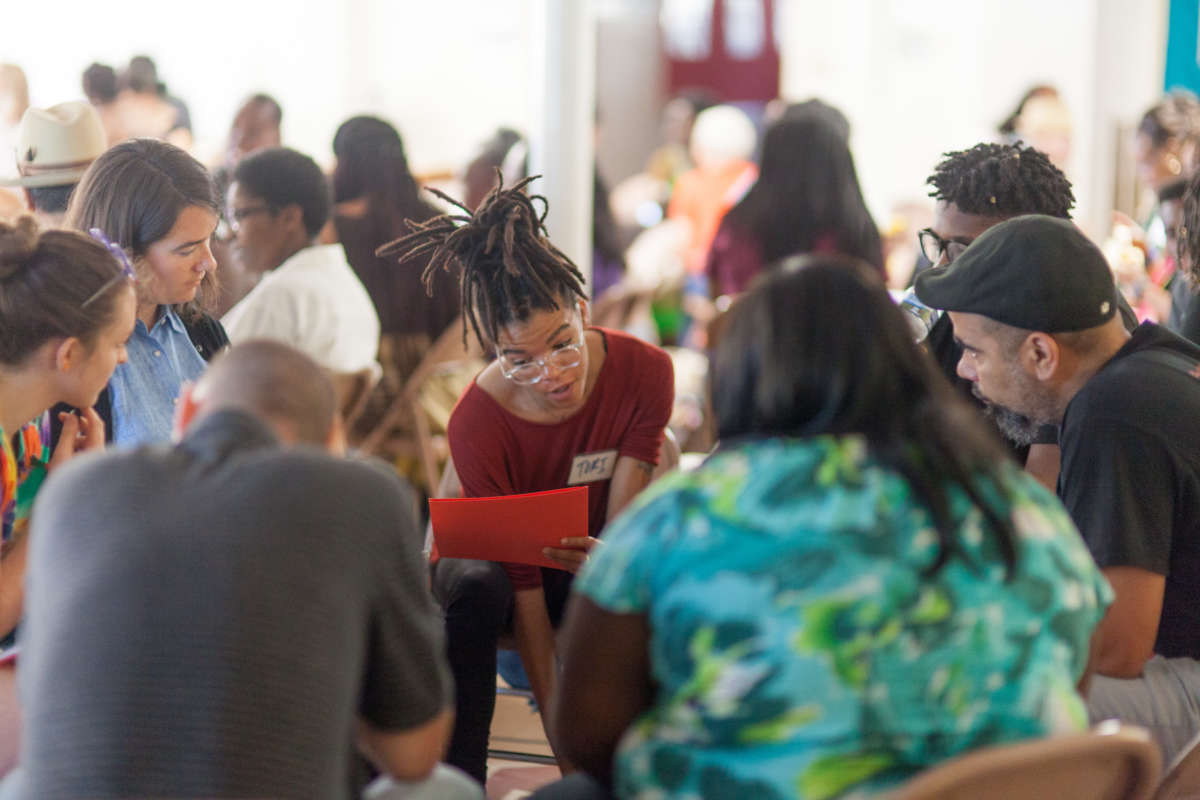Did you know that Truthout is a nonprofit and independently funded by readers like you? If you value what we do, please support our work with a donation.
If we don’t want to see a repeat (or worse) of the 2016 elections in 2020, we must organize the South. The real way change happens is through visionary and effective social movements working outside the political party apparatus. Building social movements is a steady, slow process that requires investment, resources and a clear-eyed, historical understanding of race, the South and the power of collective action. To transform the landscape and build a better future, we have to realize that just voting Trump out of office is not enough. Spoiler alert: It ain’t just about a vote.
In the South, we are living in a time when anti-democratic, racist and violent forces are on the rise: from the recent Georgia gubernatorial election in 2018 where tens of thousands of voters were purged, to a 6-year-old Black girl being handcuffed in a police car, to a homicidal white supremacist driving 10 hours to hunt and kill immigrants on the U.S.-Mexico border. Tactics like gerrymandering and voter ID policies are ripped from old Southern playbooks to prevent Black people, poor people and other marginalized communities from exercising the voting power we fought for and won in previous social movements. For hundreds of years, the brutal policies and practices of militarization, union-busting, privatization and voter suppression have been exported from the South to the rest of the country. In order to change the direction of the U.S., we all have a stake in building strong social movements rooted in the South.
For our organization, Project South, the Black radical traditions of the U.S. South serve as a guide to build political power and infrastructure at the grassroots. Building social movements includes regional power-building efforts and defensive strategies against legislative and legal attacks.
Project South moves at the crossroads of gerrymandering, redistricting, census undercounts and voter suppression. In 2018, we launched the Black Radio Project with our partners Crescent City Media Group and Love Radio to develop and broadcast audio content on over 50 Black-owned radio stations across the U.S. South. Today, there are dozens of Black-owned radio stations that are capable and willing messengers of news and information that can counter the narratives that seek to divide, suppress and otherwise distort civic participation in oppressed communities.

In 2019, we committed to combat what is functionally a civic apartheid, and the Black Radio Project builds political power through civic engagement. We are regionalizing trainings and community education sessions to prepare communities to understand how to ensure complete Census counts in so-called “hard to count” communities toward a vision of impacting the redistricting battles in 2021.
Even though the U.S. South is one of the most repressive places in the country when it comes to immigrants’ rights, we score victories through building strong coalitions, coupling grassroots organizing with legal support, and pressuring self-avowed progressive elected officials to actually put into place positive policies rather than just talk the talk.
Though Georgia has had an anti-sanctuary law on the books since 2009 to preemptively prevent officials from passing any policy even remotely considered “welcoming” toward immigrants, working alongside grassroots organizations, such as the Georgia Latino Alliance for Human Rights, we have gained victories in seven localities by putting policies into place limiting their collaboration with Immigration and Customs Enforcement.
In 2019 we also celebrated a victory in securing a veto on a bill that would have increased surveillance of immigrant students and students of color in Georgia. The bill, SB 15, would have worsened the school-to-prison pipeline and school-to-deportation pipeline that already affects students of color disproportionately. The key in accomplishing this victory was building a strong coalition between immigrants’ rights, educational rights, Latinx and Black communities.
Using the same organizing strategies, in 2018, we convinced the mayor of Atlanta to stop detaining immigrants at the Atlanta City Detention Center, proving an inspiration to local officials around the country (the mayor has also approved shutting down the jail altogether). We have dismantled the Georgia Immigration Enforcement Review Board, a vigilante body charged with punishing localities deemed friendly toward immigrants.
Southern communities defend ourselves at the same time that we build infrastructure that expands the collective ground on which to grow our own visions — principled governance, new social economies and transformative justice. At a time when the political parties have abandoned most people and the mechanisms of participation are inaccessible — or at best, fail to satisfy a desire for change — the Southern Movement Assembly provides space for sustained and meaningful political engagement. Annual regional convergences analyze the state of our movements, generate visions and goals, and adopt strategies to achieve those visions.
A people’s democracy requires infrastructure. One of the most powerful visions to emerge from the Southern Movement Assemblies is the development of Mutual Aid Liberation Centers. Groups around the South are building centers or expanding already existing centers where people come together and get what they need. We need coordinated spaces (that could be buildings, churches, abandoned schools, community centers, houses) to gather, learn, debate and decide, through ongoing education programs for young people and leadership development across generations. The centers often include community-controlled land, farms and sustainable agricultural projects. Basic services that are no longer provided by the state can be shared at these centers, from badly needed health care to self-defense courses to cultural programs. Beyond basic service provision and crisis response centers, the Mutual Aid Liberation Centers are designed to be political hubs that are governed by the people living and working in the local community.
Project South is located in South Atlanta, and with our partner, the Georgia Citizens’ Coalition on Hunger, we have transformed our two-story community center built by the United Methodist Women in 1944 into a Mutual Aid Liberation Center. There is a long history of mutual aid during Reconstruction in the South: Free Black folks were displaced from state-supplied resources, yet they managed to build tens of thousands of schools, churches and social networks. As part of a 21st century Southern Freedom movement, we are building these sanctuary and resource spaces to grow our political power in a time of ecological, financial and social crisis.

We need social movements that have strong governance practices rooted in our traditions. We need Black radio stations sharing vibrant messages to engage civic action. We need defense strategies to protect our communities from waves of harmful policies. We need leaders in Black, immigrant, Muslim, rural and queer communities trained and ready to activate coordinated networks. We need centers, land and spaces to govern as movement and community forces grow. To contend with the crises we are facing, we need all the strategies we can name, including electoral strategies and civic engagement. We need more than a candidate and more than a party. We are growing movement infrastructure to win the South, no matter what happens at the ballot box in November.
Speaking against the authoritarian crackdown
In the midst of a nationwide attack on civil liberties, Truthout urgently needs your help.
Journalism is a critical tool in the fight against Trump and his extremist agenda. The right wing knows this — that’s why they’ve taken over many legacy media publications.
But we won’t let truth be replaced by propaganda. As the Trump administration works to silence dissent, please support nonprofit independent journalism. Truthout is almost entirely funded by individual giving, so a one-time or monthly donation goes a long way. Click below to sustain our work.
